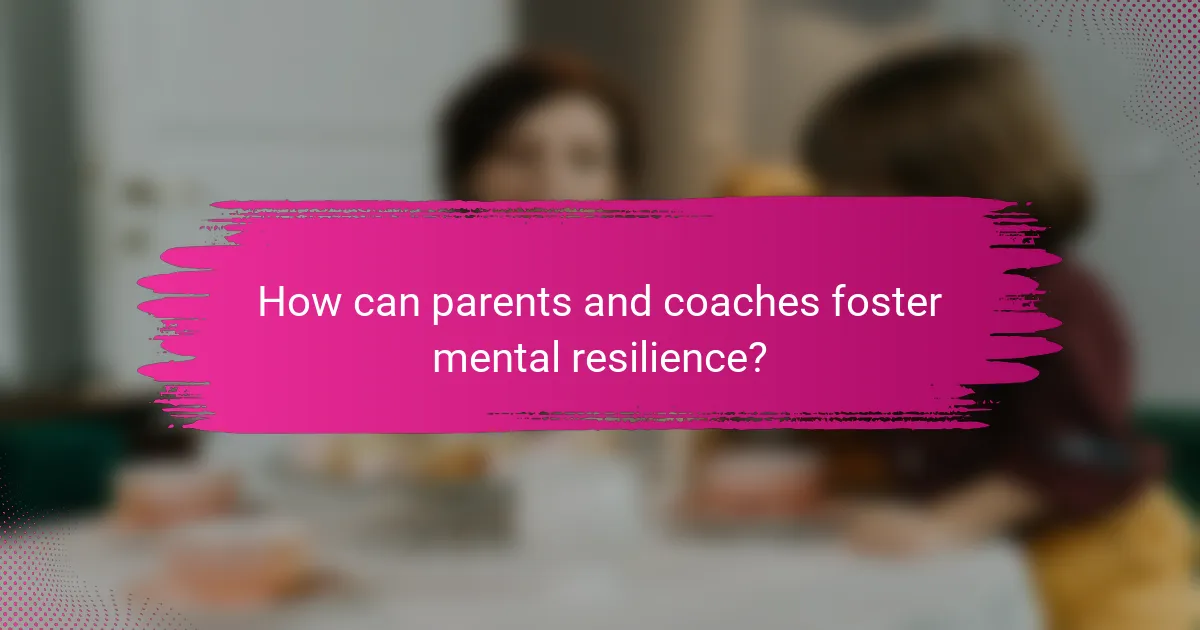Mental resilience is essential for young athletes, enhancing performance, reducing stress, and building confidence. It helps them cope with challenges, maintain focus, and recover from setbacks. Research shows that resilient athletes experience lower anxiety levels and better emotional regulation, leading to improved competition outcomes. Developing mental resilience through training techniques like visualization and positive self-talk equips athletes with the tools to navigate stress effectively and foster a growth mindset.

What is Mental Resilience in Young Athletes?
Mental resilience in young athletes is crucial for enhancing performance, reducing stress, and building confidence. It enables athletes to cope with challenges, maintain focus, and recover from setbacks. Research indicates that resilient athletes demonstrate improved emotional regulation, which positively impacts their overall performance. For instance, a study found that athletes with high mental resilience are 25% more likely to achieve their performance goals. Developing mental resilience involves training techniques such as visualization, positive self-talk, and goal setting, which can significantly enhance an athlete’s ability to perform under pressure.
How does mental resilience impact athletic performance?
Mental resilience significantly enhances athletic performance by improving focus, managing stress, and boosting confidence. Athletes with high mental resilience adapt better to challenges and setbacks, which translates into improved outcomes in competitions. Research indicates that mental resilience can lead to a 20% increase in performance metrics under pressure. This attribute is crucial for young athletes as it fosters long-term success and personal growth in their sporting journeys.
What are the signs of mental resilience in children?
Signs of mental resilience in children include adaptability to challenges, persistence in the face of setbacks, and a positive outlook. These traits enhance performance in young athletes, reduce stress, and build confidence. Children demonstrating mental resilience often show effective problem-solving skills, maintain focus during adversity, and seek support when needed. Developing these attributes is crucial for their overall well-being and success in sports and life.

What are the universal benefits of mental resilience?
Mental resilience provides young athletes with essential benefits, including improved performance, reduced stress, and increased confidence. These attributes enhance their ability to cope with challenges and setbacks. Research shows that mental resilience can lead to better focus during competitions, allowing athletes to perform at their best. Additionally, resilient athletes experience lower anxiety levels, which contributes to overall mental well-being. Building confidence through resilience fosters a positive mindset, encouraging athletes to take risks and embrace growth opportunities.
How does mental resilience enhance focus and concentration?
Mental resilience significantly enhances focus and concentration in young athletes by promoting emotional stability and mental clarity. This ability allows athletes to maintain attention on their performance, even under pressure. Resilient athletes can manage stress effectively, which reduces distractions and improves cognitive function. Studies show that mental resilience correlates with higher performance levels, as it fosters determination and a growth mindset. By cultivating mental resilience, young athletes can achieve better focus, leading to improved overall athletic performance.
What role does mental resilience play in stress management?
Mental resilience is crucial for stress management in young athletes. It enables them to cope with challenges, maintain focus, and enhance performance under pressure. Strong mental resilience helps athletes develop strategies to manage stress effectively, leading to improved confidence and reduced anxiety during competitions. Research shows that resilient athletes are more likely to recover quickly from setbacks, allowing them to remain competitive and motivated. By fostering mental resilience, young athletes can cultivate a positive mindset, ultimately enhancing their overall athletic experience.
How can mental resilience contribute to long-term athletic success?
Mental resilience significantly enhances long-term athletic success by improving performance, reducing stress, and building confidence. Athletes with strong mental resilience can better handle pressure, recover from setbacks, and maintain motivation. Research shows that mental toughness correlates with higher performance levels, particularly in competitive sports. Resilient athletes often experience lower anxiety and stress, allowing them to focus on their training and competitions. This mental strength fosters a growth mindset, encouraging continuous improvement and adaptability in challenging situations.

What unique challenges do young athletes face regarding stress?
Young athletes face unique challenges regarding stress, including performance pressure, balancing academics and sports, and social expectations. These factors can lead to anxiety, burnout, and decreased confidence. Developing mental resilience is crucial for coping with these stressors, enhancing performance, and maintaining overall well-being. Programs focusing on mental skills training can equip young athletes with tools to manage stress effectively, fostering a positive mindset and improving their athletic experience.
How do competitive pressures affect young athletes’ mental health?
Competitive pressures can significantly impact young athletes’ mental health by increasing stress and anxiety levels. High expectations from coaches and parents may lead to performance pressure, which can diminish self-esteem and confidence. Mental resilience plays a crucial role in managing these pressures, enhancing performance, and reducing stress. Studies show that athletes with strong mental resilience can cope better with competition-related stressors, resulting in improved overall well-being. Building mental resilience through techniques such as mindfulness and positive self-talk can empower young athletes to navigate competitive environments effectively.
What specific stressors are common in youth sports?
Common stressors in youth sports include performance anxiety, peer pressure, overtraining, and parental expectations. These factors can negatively impact mental resilience and overall performance. Performance anxiety arises from the fear of failure in competitive situations. Peer pressure can lead to unhealthy comparisons and self-doubt. Overtraining may cause physical and mental fatigue, reducing motivation. Parental expectations can create additional stress, influencing young athletes’ confidence levels. Addressing these stressors is crucial for developing mental resilience and promoting a positive sports experience.

What rare attributes of mental resilience can be developed?
Young athletes can develop rare attributes of mental resilience such as adaptability, emotional regulation, and intrinsic motivation. These traits enhance performance by enabling athletes to cope with challenges, manage stress effectively, and maintain a strong sense of purpose. Adaptability allows athletes to adjust strategies in response to changing conditions. Emotional regulation helps in controlling reactions under pressure. Intrinsic motivation fosters a deep commitment to personal growth and achievement.
How can emotional intelligence enhance mental resilience?
Emotional intelligence enhances mental resilience by fostering self-awareness and emotional regulation. Young athletes with high emotional intelligence can better manage stress, maintain focus, and recover from setbacks. This leads to improved performance and increased confidence in competitive environments. Research indicates that athletes with strong emotional intelligence exhibit greater adaptability and perseverance, critical factors for long-term success.
What role does social support play in building resilience?
Social support significantly enhances resilience in young athletes, improving their ability to cope with stress. It fosters a sense of belonging, which boosts confidence and performance. Studies show that athletes with strong social networks exhibit lower anxiety levels and greater persistence, leading to improved outcomes. Additionally, supportive relationships provide emotional resources that help athletes navigate challenges, making them more adaptable in competitive environments.

How can parents and coaches foster mental resilience?
Parents and coaches can foster mental resilience in young athletes by creating supportive environments, encouraging positive self-talk, and teaching coping strategies. Establishing a culture of growth mindset enhances performance and builds confidence. Regularly discussing challenges helps athletes develop problem-solving skills. Providing constructive feedback reinforces their ability to overcome setbacks. Engaging in team-building activities promotes social support, further strengthening resilience.
What strategies can be implemented to reduce stress in young athletes?
To reduce stress in young athletes, implement strategies that build mental resilience. Techniques include mindfulness training, goal setting, and positive self-talk.
Mindfulness training helps athletes focus on the present, reducing anxiety about performance. Goal setting encourages manageable targets, fostering a sense of achievement. Positive self-talk reinforces confidence, countering negative thoughts.
Incorporating regular physical activity and adequate rest also supports mental well-being. Engaging in team-building activities can enhance social connections, providing emotional support.
Finally, parental involvement and open communication create a supportive environment, allowing athletes to express concerns and seek guidance.
How can goal-setting improve mental resilience?
Goal-setting enhances mental resilience by providing direction, fostering motivation, and building self-confidence. Clear, achievable goals help young athletes focus on their performance, reducing anxiety and stress. Research indicates that athletes who set specific goals experience improved mental toughness and adaptability during competitions. By tracking progress, they develop a sense of accomplishment, reinforcing their resilience and commitment to improvement.

What best practices can enhance mental resilience in youth sports?
To enhance mental resilience in youth sports, focus on fostering a supportive environment, teaching coping strategies, and encouraging positive self-talk. These practices improve performance, reduce stress, and build confidence in young athletes.
Supportive environments involve coaches and parents providing emotional backing, which helps athletes feel secure. Teaching coping strategies equips youth with tools to handle pressure, enabling them to navigate challenges effectively. Positive self-talk reinforces their belief in abilities, promoting a growth mindset.
Incorporating regular mental skills training sessions can further strengthen resilience, allowing athletes to practice these techniques consistently. Engaging in team-building activities enhances camaraderie, creating a sense of belonging that boosts mental fortitude.
Lastly, recognizing and celebrating small achievements fosters motivation and reinforces resilience, encouraging young athletes to persevere through difficulties.
What common mistakes should be avoided when promoting resilience?
To promote resilience effectively, avoid overemphasizing competition, neglecting mental health, and dismissing individual differences. Recognizing that each young athlete has unique needs is crucial. Fostering a supportive environment enhances confidence and reduces stress. Focusing solely on physical performance can undermine mental growth. Encouraging open communication about challenges promotes resilience.
How can mindfulness techniques be integrated into training?
Mindfulness techniques can enhance mental resilience in young athletes by integrating practices like meditation and breathing exercises into training sessions. These techniques improve focus, reduce anxiety, and foster a positive mindset. For example, incorporating short mindfulness breaks during practice can help athletes reset and refocus, ultimately enhancing their performance. Regular mindfulness practice can lead to increased self-awareness and confidence, essential attributes for young athletes facing competitive pressure.
What expert insights can guide parents and coaches in this journey?
Expert insights emphasize the significance of mental resilience in young athletes. Coaches and parents should foster an environment that prioritises emotional support, encourages open communication, and teaches coping strategies. Research shows that athletes with strong mental resilience experience enhanced performance, reduced stress, and increased confidence. Implementing regular mental skills training, such as visualization and mindfulness, can be beneficial. Additionally, promoting a growth mindset helps athletes view challenges as opportunities for development. Engaging in team-building activities can further strengthen bonds and resilience among young athletes.


